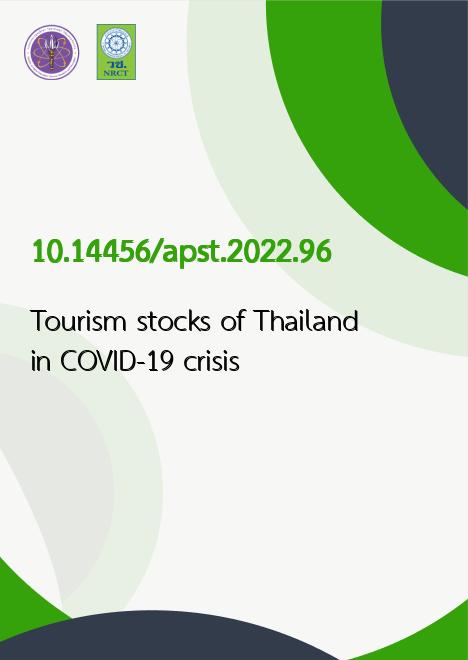
|
Tourism stocks of Thailand in COVID-19 crisis |
|---|---|
| รหัสดีโอไอ | |
| Creator | Teera Kiatmanaroch |
| Title | Tourism stocks of Thailand in COVID-19 crisis |
| Contributor | Ornanong Puarattanaarunkorn |
| Publisher | Asia-Pacific Journal of Science and Technology |
| Publication Year | 2565 |
| Journal Title | Asia-Pacific Journal of Science and Technology |
| Journal Vol. | 27 |
| Journal No. | 6 |
| Page no. | 9 |
| Keyword | Covid-19, Tourism stock, Quantitative easing measures, GJR-GARCH mode |
| URL Website | https://www.tci-thaijo.org/index.php/APST |
| Website title | https://so01.tci-thaijo.org/index.php/APST/article/view/262651 |
| ISSN | 2539-6293 |
| Abstract | The COVID-19 pandemic has affected economies worldwide impacting on industry, service, tourism, and financial sectors including stock markets. This study aims to examine the impact of the COVID-19 pandemic on the volatility of the Tourism & Leisure stock index within the Stock Exchange of Thailand. The The GlostenJagannathanRunkle GARCH (GJR-GARCH) (1,1) model is chosen to analyze the volatility of the data series. The analysis reveals that long-run persistent volatility exists in Tourism & Leisure stocks from shock events. Moreover, negative shocks appear to cause a greater increase in volatility than positive shocks due to the leverage effect. To analyze the impact of COVID-19 on tourism stock volatility, a dummy COVID-19 variable is added to the conditional variance of the GJR-GARCH (1,1) equation. The empirical findings show a significant positive coefficient in the COVID-19 dummy variable for conditional variance, although it is very small. This indicates that the COVID-19 pandemic has had a significant positive impact on tourism stock volatility, although the increase is only slight. This may be due to the Federal Reserve's announcement regarding the unlimited quantitative easing measures in response to the COVID-19 crisis. The results of this study can be used to assist investors and policymakers in their decision- making and risk management of future pandemics. |